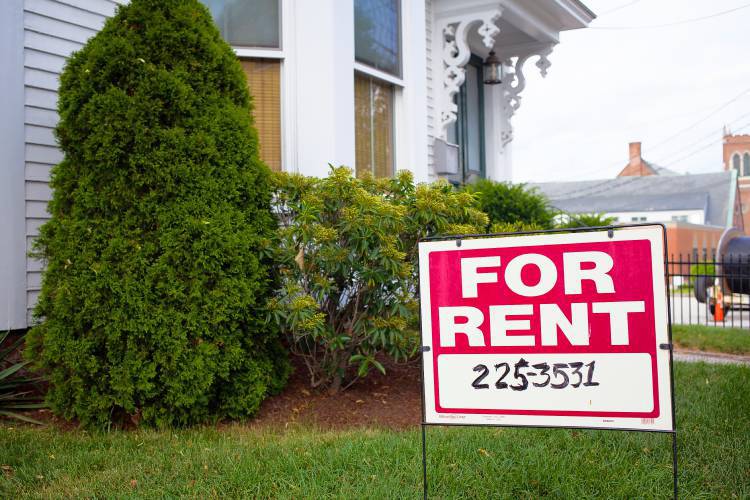In latest attempt to pass eviction bill, House votes to include in budget

A "for rent" sign is seen outside a home on Washington Street in Concord on Wednesday, July 12, 2017. (ELIZABETH FRANTZ / Monitor staff) ELIZABETH FRANTZ
| Published: 04-13-2025 12:00 PM |
Bob Lynn is hoping the third or maybe the fourth time is the charm.
In the last year, Lynn, a Windham Republican and former state Supreme Court Justice, has successfully watched his bill – which would allow landlords to terminate leases with tenants after six months, no questions asked – pass the House on four different occasions.
This year, he’s hoping it’s fate won’t be short-lived in the Senate.
House lawmakers passed Lynn’s provision for the second time this session, tucked into their version of the state budget.
To Rep. Heath Howard, a Strafford Democrat, Lynn’s proposal would unnecessarily tarnish tenants' rental records with mindless evictions, a kiss of death in a tight housing market.
“We want to make housing easier to find, not harder, because we need workers to stay in our state while we are in the middle of a housing crisis,” he said. “This policy evicts good tenants at a time when vacancy is at a record low.”
Lynn disagrees.
To him, the proposal cleans up a messy provision of state contract law.
Article continues after...
Yesterday's Most Read Articles
 ‘New Hampshire is just going to embarrass itself’: Former Child Advocate warns against proposed office cuts
‘New Hampshire is just going to embarrass itself’: Former Child Advocate warns against proposed office cuts
 ‘A large chunk of change’: Feathered Friend Brewing disputes tariff on Canadian import
‘A large chunk of change’: Feathered Friend Brewing disputes tariff on Canadian import
 Two of five Grappone auto franchises to be sold as part of family transition
Two of five Grappone auto franchises to be sold as part of family transition
 Bow recognizes two DPW workers who rescued driver of overturned propane truck
Bow recognizes two DPW workers who rescued driver of overturned propane truck
 High schools: Wednesday’s lacrosse, baseball, softball and tennis results
High schools: Wednesday’s lacrosse, baseball, softball and tennis results
 ‘Erosion of civil public discourse’ – Concord mayor makes plea for more civility
‘Erosion of civil public discourse’ – Concord mayor makes plea for more civility
“If we had to label this, we could label it I suppose, ‘a contract means what it says’,” he said in a House hearing in January.
Based off of a state Supreme Court decision from 2005, Amico Properties v. Dziewisz, current state law does not allow for landlords to end lease agreements at the end of their term without reason.
“From the landlord’s perspective, the landlord cannot evict you simply because the lease is over,” said Lynn. “That is sort of a flagrant affront to basic contract principles.”
Lynn’s proposal adds a provision that the end of a lease that is longer than six months is grounds for an eviction. Currently, a landlord is only able to evict a tenant if they violate the contract – like not paying rent or destroying property – or if the landlord wishes to remove the unit from the market.
The House passed his bill in early February despite two amendments from Democrats that attempted to add in protections, such as the rental vacancy rate in the state must be 5% or higher for this to take effect.
In the last ten years, rental vacancy rates have not surpassed 3%, according to data from New Hampshire Housing. In 2023, the vacancy rate was 0.8% for all units statewide.
At the same time, median rent has increased rapidly, with a 35 percent change in the last five years.
Housing advocates, tenants and lawyers decried Lynn’s proposal in a three hour public hearing in January, stating that the new clause would lead to a spike in evictions and an increase in people falling into homelessness.
Again, Lynn disagreed.
“There’s no reason to believe that it’s any more likely that someone who is evicted will become homeless than there is to believe that somebody who becomes a new tenant doesn’t come from the homeless,” he said. “It’s a nice talking point for people who oppose the bill.”
Last year, Lynn’s proposal was killed by the Senate Commerce Committee with a unanimous vote.
Senator Daniel Innis, a Bradford Republican, stated that the bill was unnecessary due to existing landlord protections in state law and the current housing market.
Lynn tried again to push it forward at the end of the session by tacking the bill onto a proposal to create civil actions for PFAS contamination, which was also voted down in the Senate.
Now the Senate will consider the “good cause” claim in two arenas –first, through the regular legislative process, where the bill is set to have a public hearing in the Commerce committee, as well as with the proposed budget.







 Baseball: Slow night at the plate costs Concord in loss to Windham, 3-1
Baseball: Slow night at the plate costs Concord in loss to Windham, 3-1 ‘It's like slow genocide’: Crowd rallies against proposed Medicaid cuts
‘It's like slow genocide’: Crowd rallies against proposed Medicaid cuts New Hampshire births fell to a modern low in 2024
New Hampshire births fell to a modern low in 2024
